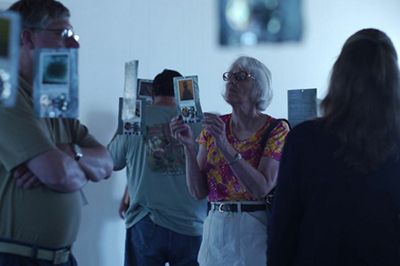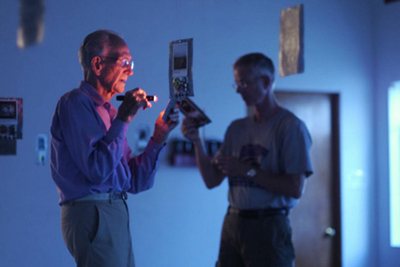Originally written by Joseph Carman on July 7, 2014 for www.555c.org.
Folleh Tamba’s A Grunt’s War Diary opened on July 3rd, 2014 at the Calvert Evins Memorial in St. Francis, Kansas. Joseph Carman, director of the 555 Collective, handed Tamba the challenge of transforming a dilapidated old church in a small northwestern Kansas town into a showcase of his daydreams and nightmares of war – he responded like only a Marine Corps Sergeant with an MFA in Interdisciplinary Art and Media can – and he is the only human being who matches that description on this planet.
Now, in the center of the continental United States, sits a metaphor for all of the forgotten and misunderstood, battle wearied minds of our nation’s combat veterans, whose blood and toil has earned us all the right to ignore them as we earn our daily bread and continue the pursuit of our own individual interpretations of happiness.
The following are reactions from initial visitors to A Grunt’s War Diary, currently set to run until September 2014, followed by a nationwide tour (we are seeking donations, grants, and sponsorships to help bring this experience to the American public as a whole).
“Sgt. Tamba educates us about things that are numbingly commonplace when one has served in combat and then made the journey home. He manages to conjure not only visual scenes for us, but also “images” of smells and sounds, of temperatures and vibrations. We can feel the oppressive desert heat, smell the death and decay all around the fetid urban hellpits of Iraq. His journal also eloquently documents the unexpected yet no less powerful challenges of homecoming: he finds that, rather than feeling honored as a hero, he is caged by… complexion and class and racially profiled by civilian police” -Dr. John Mundt – Licensed Clinical Psychologist, VA.
“Small art pieces hang from the ceiling, displaying diary entries along with photos and the sounds of war; ipads mounted on the walls linked to headphones invite you to see and listen; a documentary made by Tamba plays behind a dark screen. The simplicity of the exhibit belies its technological complexity. The experience is both real and moving. In this clear open space there is room for the ambient sounds and images of war that provide the backdrop for what is revealed through the words of the diary. It is the words that tell the story and move the heart.”
“The poetry is magnetic and beautiful in every way.”
“I can’t stop the tears.”
“This not only bears, it invites, repeated viewing.”
“You’ve done it. Your work is brilliant, but you already know that.”
“A piece of your soul… A piece of your life – shared with us… Thank you!”
“Speechless…”
“Amazing is not a big enough word.”
“Words escape me – but I’m grateful you helped me experience a bit of what my son may have experienced.”
“Thought provoking and incredibly well put together.”
“So painful and hard to experience.”
“Thank you so much for reminding those of us that enjoy our freedom every day for your enormous strength and endurance.”



